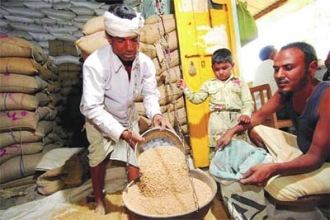Some basic info to understand this news better:
- Under the Antyodaya Anna Yojana (AAY) scheme, the Centre provides 35 kg grains to each ‘poorest of the poor’ household at the rate of Rs 3 per kg for rice and Rs 2 for wheat.
- The total number of AAY beneficiaries who get subsidised food is also capped at 2.5 crore
Now, the news:
- At a time when the Centre is pressing states to quickly adopt the National Food Security Act (NFSA), the Public Distribution System (PDS) control order 2015 seeks to slowly reduce the number of people who would get additional benefits for being the poorest of the poor.
- The order states that no new beneficiaries would be added to the Antyodaya Anna Yojana (AAY) to replace those who become ineligible due to either migration or improvement in their status or death.
- The order also states that census data of 2011 will be used till 2022-23 by the Centre for allocation of foodgrain under the Targeted Public Distribution Scheme (TPDS) and no new beneficiaries could be added on to list based on four-year old data. The state would have to bear the cost of additional population added to the beneficiary list.

Know more on this news topic:
- The National Food Security Act, 2013 (also Right to Food Act) is an Act of the Parliament of India which aims to provide subsidized food grains to approximately two thirds of India’s 1.2 billion people
- Under the provisions of the bill, beneficiaries of the Public Distribution System (or, PDS) are entitled to 5 kilograms (11 lb) per person per month of cereals at the following prices:Rice at ₹3 (4.8¢ US) per kg.Wheat at ₹2 (3.2¢ US) per kg.Coarse grains (millet) at ₹1 (1.6¢ US) per kg.Pregnant women, lactating mothers, and certain categories of children are eligible for daily free meals.
AffairsCloud Recommends Oliveboard Mock Test
AffairsCloud Ebook - Support Us to Grow
Govt Jobs by Category
Bank Jobs Notification





